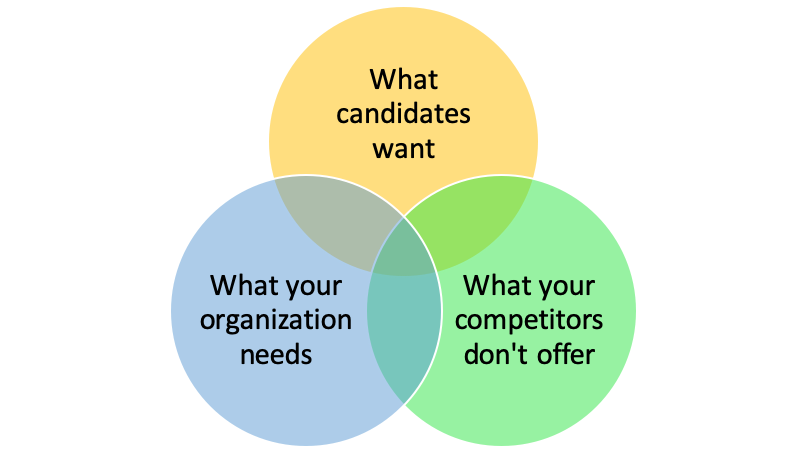Last time we looked at some recruitment marketing basics that you should be mastering if you are struggling to fill roles, particularly the high-turnover jobs. Today we’ll dig in on the first item in your toolkit, the employer brand.
Employer branding is having a moment, but it’s certainly nothing new, and here’s a newsflash: you already have an employer brand whether you know it or not. If you aren’t actively managing it, chances are it’s not a great employer brand, but it’s a place to start. So what is an employer brand? Basically it’s what your past, present and future employees think of your company as a place to work. We all know those companies where the pay is lousy or the culture is toxic or the management is clueless – that place those companies occupy in your brain is their employer brand. You don’t want to be that brand.
Figuring out your employer brand is a longer process, and one I recommend you get some professional help with, but assuming your research shows a reasonably decent brand that people want to hang out with, you need to make it real by coming up with a strong employee value proposition (EVP). The EVP answers the simple question: why should anyone work at your company?
This one can be a little harder to pull together, and it needs to rooted in your corporate values and tied to your mission. Now, if your values are a bit wobbly or your mission statement fell of the wall in the boardroom and hasn’t been seen in a while, you should probably get that house in order first.
Let’s pretend you have a great set of values that are easy to understand, realistic and authentic. My advice is to pick one or maybe two of them to be your EVP pillars. Some companies go overboard on this and try to prop up the employer brand with five or more pillars. I think that’s overdoing it, and you end up with a messy brand to manage.
So which value do we hang our EVP on? I would say the one that you think is both most resonant to candidates and employees and the one you can actually prove your organization pays attention to and demonstrably lives on a day to day basis. Here are some good corporate values for building up an EVP:
- Opportunity
- Community
- Expertise
- Diversity and Inclusion
- Customer service
- Culture
- Sustainability
- Respect
If you’re like most companies, your values came out of an exasperating committee sometime in the 1990s and so you likely have way more than you actually need, and many are self-evident goals rather than actual values. I’d avoid using anything that talks about:
- Shareholder value
- Safety
- Your leadership team
- Fiscal responsibility
- Competitiveness
- Cleaning the microwave in the break room
If you have recent employee data, say from an engagement survey or focus groups that discuss values, you can probably figure out which one or two values to include in the EVP. If not, you will need to get employee input on which values are part of the lived experience, and which ones they actually care about.
Let’s say you picked opportunity and sustainability as your EVP foundations. Now we need to put those ideas into a succinct statement that your recruiters can work with to better market the roles they need fill. In my view, the best EVPs live at the intersection of meeting the needs of your candidates, meeting the needs of your company, and standing out from other employers.
So working with the values we chose above, an EVP might go like this: We’re a team of passionate doers who are on a journey to save the planet. Bring your talent and watch it grow in our small, supportive team environment.
The idea here is not to have the prettiest or most articulate statement. The idea is to be very, very clear on what matters most from both the candidate and employer perspective. Honeywell, for example, has this straightforward EVP: “You can make a difference by helping to build a smarter, safer and more sustainable world.” Not frilly, but very specific. Nike’s is more aspirational, but delivers a pretty clear idea of what it’s like to work there: “We lead. We invent. We deliver. We use the power of sport to move the world.”
PwC’s proposition is entirely focused on employee opportunity: “From empowering mentorships to customized coaching, PwC provides you with the support you need to help develop your career. You’ll work with people from diverse backgrounds and industries to solve important problems. Are you ready to grow?”
If writing isn’t your thing, see if someone in the marketing department can help you craft a few versions of your EVP to test with recruiters and employees. If the marketers tell you to get lost, hire a freelance writer to help you out. Again, it doesn’t need to be pretty or fit nicely on a mug to be a good EVP.
So what now? That EVP, along with your employer brand, needs to inform pretty much every aspect of your recruiting. It should be all over your careers pages, job postings, offer letters and employee communications.
It’s also a good idea to test it periodically with employees to see if it’s still the right message. A good EVP will need tweaking every couple of years.
Next time we’ll look at how cleaning up your candidate experience can make your recruiting a lot more effective.
Related Posts (or not)
Marketing Needs to Take Employer Brands Seriously
Guess Who Really Owns Your Brand?
BizMarketer is the Candler Chase blog.
We work at the intersection of HR and marketing to help organizations build their brands and have great conversations with employees and customers.
Drop me a line at ewilliams(at)candlerchase.com
Follow me @bizmkter

Leave a Reply
You must be logged in to post a comment.